| Bahareh Hedayat | Isa Saharkhiz | Heshmat Tabarzadi | Mehdi Kouhkan | Ahmad Zeidabadi |
| Nasrin Sotoudeh | Ali Shirasi | Amir Hekmati | ||
One of them, Bahareh Hedayat, student, political
activist, initiator of the  campaign „1
Million Signatures for
the Repeal of Discriminatory Laws“ and sentenced to nine and a half
years in prison, recently send an open letter to her husband Amin.
campaign „1
Million Signatures for
the Repeal of Discriminatory Laws“ and sentenced to nine and a half
years in prison, recently send an open letter to her husband Amin.
This
letter
is not only a document of the power of human
spirit to resist torture and oppression, but
it is also written in a very beautiful
language that reminds one on the poetry of
Hafiz and Rumi.
This web-site will publish
translations of Bahareh Hedayat's letter in
different languages, thus forming a Rosetta
Stone like document that should remind
people all over the world of the situation
of Mrs. Hedayat and of other political
prisoners in Iran.
| English | German | Swedish | Chinese (trad) | Croatian | Danish | Polish | Italian |
|
|
|
| Poetic English | Persian/Farsi | French | Chinese (simpl) | Spanish | Hindi | Czech |
|
|
|
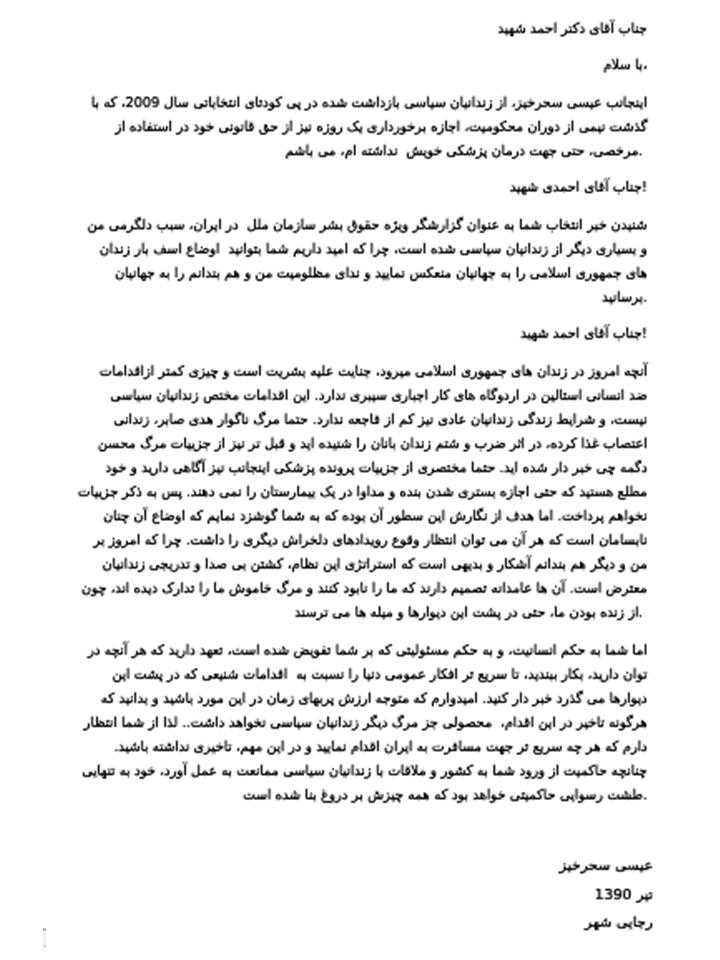
Mr. Saharkhiz recently wrote a letter from inside Rajai Shahr
prison to the UN Human Rights Special
Rapporteur, Dr. Ahmad Shaheed, urging
him to take immediate action and travel
to Iran. Saharkhiz describes the Iranian
prison system for political activists as
a sophisticated program to mentally and
physically destroy its victims.
Heshmat
Tabarzadi is an Iranian journalist and
democratic activist. He was arrested on
December 28, 2009, in front of his wife and
son by agents who also seized his books,
papers, and computer, and is currently being
held at an unknown location.
Tabarzadi
published an opinion
piece
in the Wall Street Journal on December
17, 2009. In his op-ed, he wrote: "If the
government continues to opt for violence,
there very well may be another revolution in
Iran. One side has to step down. And that
side is the government—not the people.
Tabarzadi was
viewed by the regime as one of the leaders
of the student protests of July 9, 1999. He
was arrested and spent nine years in Evin
Prison, including two in solitary
confinement, for his activities as a student
leader.
On October 3rd
Heshmatollah Tabarzadi was sentenced to 9
years in prison and 74 lashes
He has been
convicted of conspiracy and assembly to
commit a crime against national security and
insulting the Supreme Leader. Tabarzadi was
detained on December 28th after the Ashura
protests and transferred to solitary
confinement in Ward 209 of the Evin Prison.
He was later transferred to the Rajaei Shahr
prison for protesting the execution of the 5
Kurdish activists including Farzad Kamangar.
From Rajaei Shahr he wrote a response
to
his political trial.
Heshmat's son
Hossein has visited his father after
he participated in several hunger strikes.
His son was most concerned
about
the critical health conditions of Mr.
Tabarzadi which are a direct consequence of
the deleterious conditions at this notorious
detention facility.
Mehdi
(Kourosh)
Kouhkan,
political prisoner in Ward 350, is in need of
surgery. The
judicial
authorities
have halted
his treatment
and have
failed to
transfer him
to a hospital.
He is in poor
condition and
may lose his
leg if he is
not treated.
Update:
Together with 74
other political
prisoners from
Evin, Mehdi
Kouhkan was
granted pardon
on August 17th
2012 (Source: Kaleme
and BanooyeSabz)
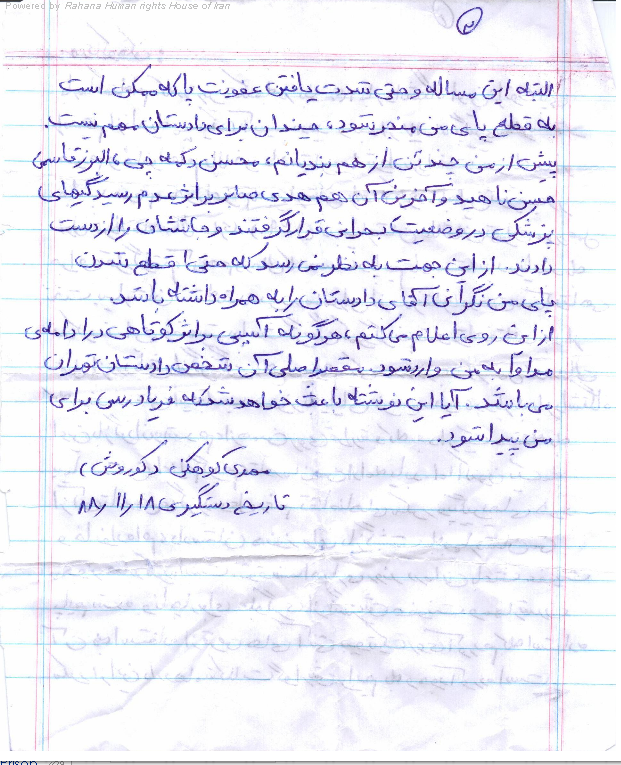
| English | German |
|
|
|
||||||||
| Persian/Farsi |
|
|
Ahmad
Zeidabadi is an
imprisoned
journalist and the
Secretary General
of Tahkim Vahdat,
a prominent
student alumni
organization in
Iran. He has
been imprisoned
for 767 days and
has not been
granted furlough.
He was
sentenced to six
years in prison
and five years
exile to Gonabad
(a county in the
Razavi Khorasan
province in Iran). In May 2011,
an independent
international jury
of 12 media
professionals
selected Mr
Zeidabadias the
laureate of this
year’s UNESCO/Guillermo
Cano
World Press
Freedom Prize. His letter from
Rajai Shahr
‘Gohardasht’
prison to his
wife Mahdieh
Mohammadi on
the occasion
of her
birthday
was recently
published by Advar-News.
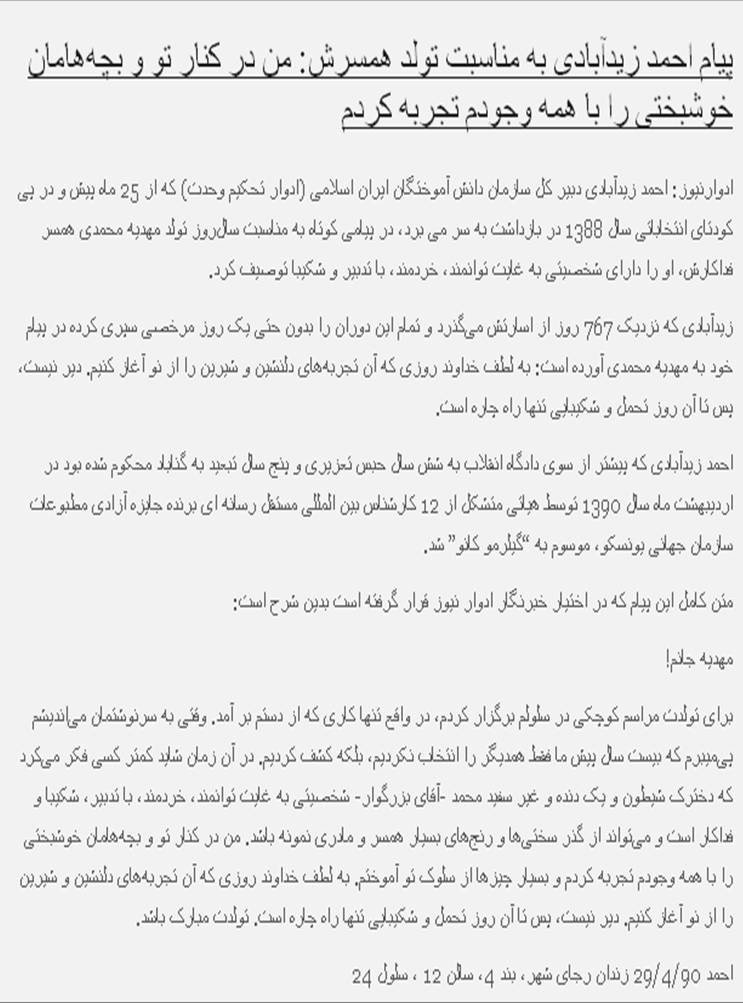
| English | German |
|
|
|
||||||||
| Persian/Farsi |
|
|
Nasrin
Sotoudeh,
a lawyer,
women and
human rights
activist who
has been
imprisoned in
Evin prison
for over nine
months, has
written a few
letters to her
children, her
three year old
son Nima and
her eleven
year old
daughter,
Mehraveh. She
has written
these letters
on paper
tissues since
she has been
denied
stationary. A
photocopy of
the original
letters
written on
toilet paper
is attached. (Source: The
feminist school)
Ms. Sotoodeh
was put on
trial in
branch 26 of
the
Revolutionary
Court. She was
charged with
propaganda
against the
Islamic
Republic of
Iran’s regime,
acting against
national
security, and
membership in
the
Association of
Human Rights
Defenders. She
has been
sentenced to
11 years of
punitive
imprisonment
and barred
from
practicing law
or leaving the
country for 20
years due to
these charges.
In addition,
she was fined
50, 000 tomans
(approximately
$50) for
appearing
improperly
veiled in a
video clip of
a speech of
hers.
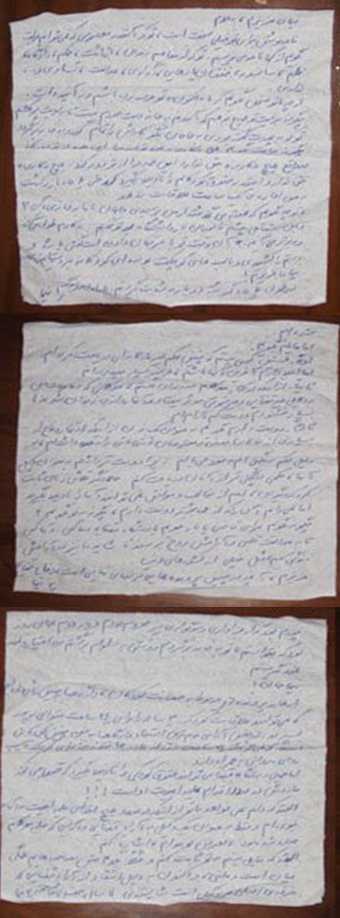
| English | German |
|
|
|
||||||||
| Persian/Farsi | Italian |
|
|
|
Ali
Shirasi is a teacher of
mathematics, statistics and
macro-economy. He became
politically active during the
1960s, when he organized a
teachers union in Tehran. The
established system under the
Shah became aware of his
political activities and he was
subsequently imprisoned in 1975.
Thanks to the intervention of
International Red Cross, Ali
Shirasi was released from prison
in 1978. His real struggle began
in the wake of the “Islamic
Revolution” under Khomeini, when
he was imprisoned in Evin and
tortured. As a consequence of
his treatment in Evin prison, Mr
Shirasi suffered several health
complications and was
temporarily released to receive
medical treatment. During this
time he fled Iran and since 1987
lives in Germany. He is a poet,
writer and ambassador of Iranian
arts and culture. (Source: Ali
Shirasi web page) |
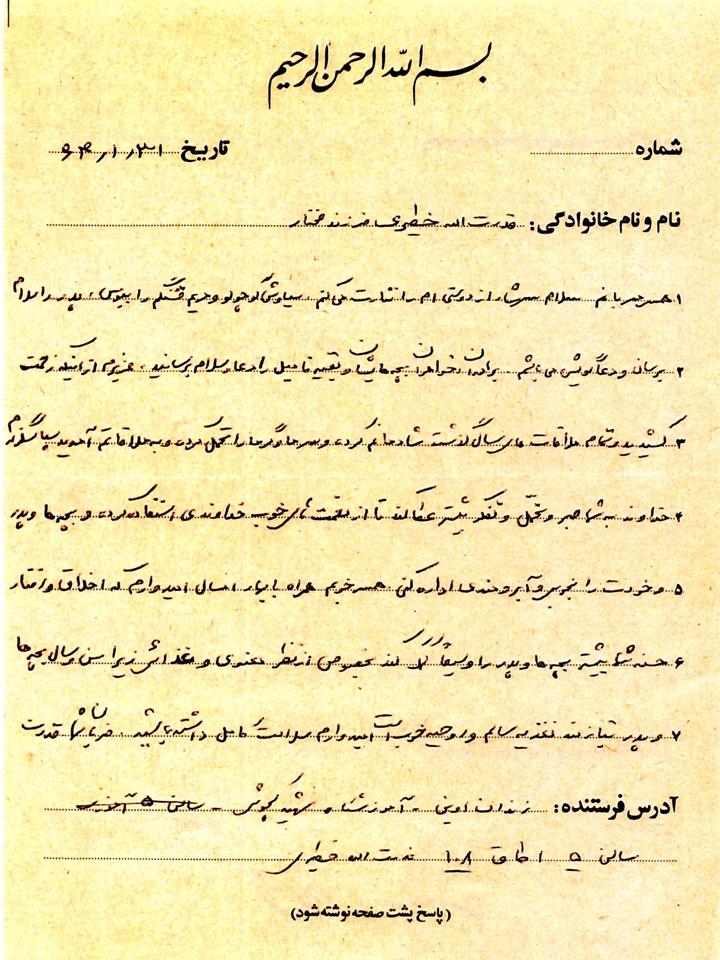 |
| English | German |
|
|
|
||||||||
| Persian/Farsi |
|
|
|
Amir
Hekmati is an US citizen with
Iranian roots. On a privat trip to his
relatives in Tehran, Amir was arrested
in 2011 by the police and accused of
espionage. On the base of fabricated
evidence he was initially sentenced to
death, but an appeal court overturned
this initial decision. Since then Amir
sits in solitary confinement
at Evin Prison.
After an official inquiry his sister, Sarah Hekmati was told that there will be a review of his case, but neither his lawyer nor Amirs relatives living in Iran and the US were given the possibility to see him. It is questionable how an honest investigation of his case should be possible under such circumstances. In January 2013 the Hekmati family made a plea to the Iranian authorities and wrote a letter to the Iranian surpreme leader Ali Khamenei, asking to either grant Amir a new legal case or release him from prison. But since more than a year now, his family in Michigan hasn’t been allowed to talk to Amir at all – no letters, no phone calls, nothing. It seems a particular cruel form of psychological terror to refuse a prisoner all contacts with his family for such a long time. We know very well from similar cases of political prisoners in Iran that applying such mental pressure is often intended to get any confession that suits the regime. We hope that one day Amir will be back to his family and friends, and he will be able to write about his time in Evin. At the moment, we only can show a letter from Sarah Hekmati to the US Senat, to the House of Representatives and to the US Secretary of State. You might sign this letter in a petition here. |
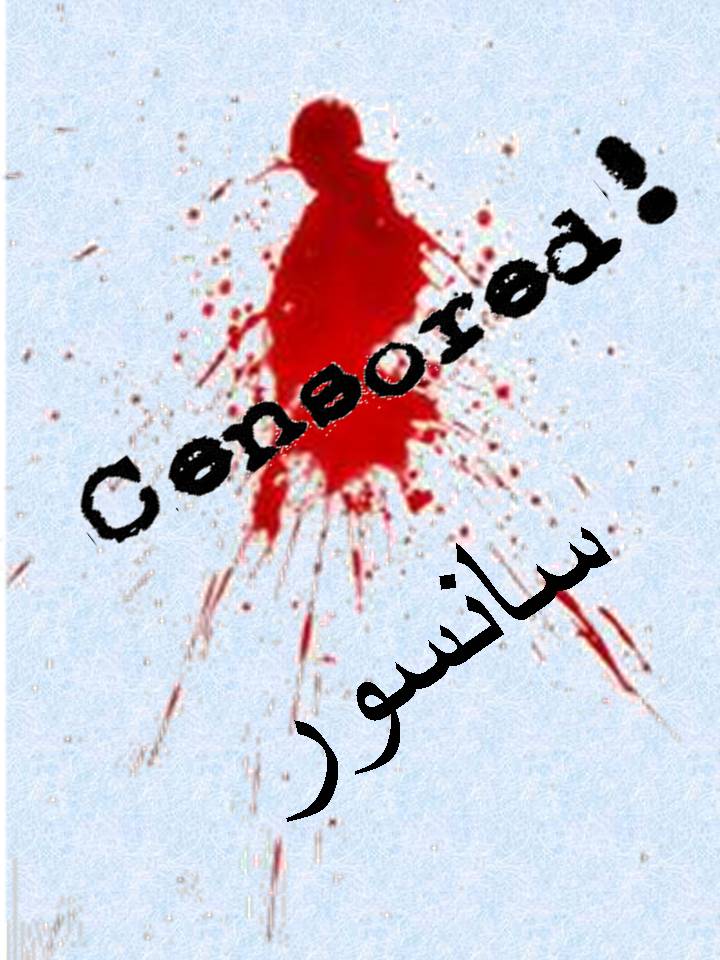 |
| English | German |
|
|
|
||||||||
|
|
|
If you would like to contribute a translation to a language not yet listed, please e-mail to evin-rosetta (at) persian-cat.de